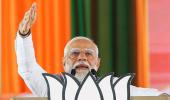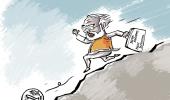'In the new coalition government, India's reform agenda may prioritise job creation and factor market reforms.'

As the Narendra Modi-led National Democratic Alliance government readies to take charge in the next few days, India Inc leaders said the focus should be on creating jobs and controlling inflation.
According to a dipstick poll of 15 CEOs, infrastructure and health care sectors should also receive special attention.
Issues, such as rising prices and unemployment, were the main complaints of voters in the recently concluded general elections.
"Inflation is well-behaved due to the combined impact of monetary and fiscal policy and a very watchful RBI monitoring the external environment. If these remain unchanged, inflation should not pose a big challenge to policymakers," said a CEO, asking not to be quoted.
"In the new coalition government, India's reform agenda may prioritise job creation and factor market reforms. This shift could stem from addressing unemployment, enhancing competitiveness, and attracting investments. Emphasising these reforms could bolster economic growth and social development in the country," said another CEO, asking not to be quoted.

As much as 60 per cent of respondents see private capital expenditure to go up, with the government expected to continue manufacturing-boosting measures like production-linked incentive (PLI) schemes, while a third of the CEOs said private capex would remain muted.
"Building social infrastructure like education, health, and information technology has to remain as much a focus as physical infrastructure, to create a multiplier effect on growth," said Harsh Pati Singhania, chairman and managing director of JK Paper and director of JK Organisation.
"Promoting farm growth and enhancing the competitiveness of Indian business to take on the world through policy reforms and easing of rules and regulations must be a top priority," he said.
Over 53 per cent of the respondents expect the RBI to cut interest rates, while a majority of them said they were not sure whether the BSE Sensex, which saw massive volatility early this week, would cross the 85,000 mark by FY25-end.
On Thursday, June 6, 2024, the Sensex closed at 75,075, up 692 points.
A majority of the CEOs (53.3 per cent) said they do not expect the rupee to be stronger by year-end.
Apart from investing in infrastructure, the CEOs said, focus on the semiconductor and electronics industries should also continue.
"Simplifying and streamlining the regulations across sectors will continue to take India higher in ease of doing business rankings," said a CEO, requesting not to be quoted.
When asked whether they expect the privatisation of public sector units under the new coalition government to continue, the response was divided.

About the biggest concern in the economy, CEOs cited high fiscal deficit, unemployment, and demand, among others.
"My biggest concern regarding the Indian economy is the fiscal deficit. It poses risks to economic stability, potentially leading to inflation, increased borrowing costs, and reduced public spending on essential services. Addressing this deficit is crucial for sustainable growth and maintaining investor confidence," said a CEO of a tech company.
While some CEOs saw geopolitical changes as a big threat, a couple of them also pointed to low rural growth and judicial reforms.
"The external sector developments, like geopolitical tensions and weaknesses in economic growth in some regions, have a bearing on our trade," said a CEO of a financial services firm.
Feature Presentation: Aslam Hunani/Rediff.com












 © 2025
© 2025